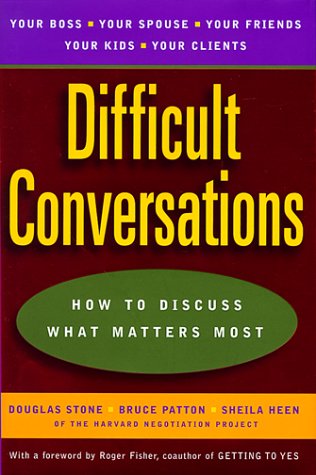Racially insensitive comments are like farts - they happen, they linger, they stink, and they are hard to talk about. A friend of mine sent me the following video clip. In it, a man details an effective way to handle racially insensitive comments. I think his strategy deserves recognition:
Now you may wonder, why go through all this trouble instead of just calling a racist a racist, cursing him out, and keeping it moving? Well for starters, handling it in that manner doesn't foster any understanding. Many times racially insensitive comments are made because the person doesn't recognize the insensitivity. If I immediately call that person a racist, communication, and subsequently an opportunity to teach, has been lost.
Earlier this month I went to a discussion group on this book:
 The book gives you a variety of tools for handling stressful conversations. In the book the author stresses the importance of separating the instance/action from the individual (get the ebook at the Ebooks For Your Life Blog). It is the difference between addressing a statement as being racially insensitive and making a blanket assumption that because a person made a racially insensitive comment, he must be a racist. This assumption is illogical for a variety of reasons - most importantly because to be a racist, a person must exhibit a pattern of racially insensitive behavior. If you are dealing with one statement, and have no further knowledge of a pattern of behavior, then you cannot logically argue that the person making the statement is a racist.
The book gives you a variety of tools for handling stressful conversations. In the book the author stresses the importance of separating the instance/action from the individual (get the ebook at the Ebooks For Your Life Blog). It is the difference between addressing a statement as being racially insensitive and making a blanket assumption that because a person made a racially insensitive comment, he must be a racist. This assumption is illogical for a variety of reasons - most importantly because to be a racist, a person must exhibit a pattern of racially insensitive behavior. If you are dealing with one statement, and have no further knowledge of a pattern of behavior, then you cannot logically argue that the person making the statement is a racist.
A better way of handling the situation, as outlined in the video is to address the statement. For example, "sir, are you aware that your statement comes across as offensive?" Asking instead of presuming will go along way to keep the lines of communication open - which is your ultimate goal. You want to inquire as to he felt no problem with making the statement. You want to communicate how the statement could be misconstrued as offensive. You want to turn the situation into something potentially positive.
What you don't want to do is not hold a person accountable for their statement. When you question the identity instead of the action, you allow a line of defense to be introduced regarding all the ways that said person is not a racist, instead of addressing the actual statement. For example, if someone makes a comment about blacks eating chicken - and I call him a racist - his immediate defense will likely be to outline all the ways in which he is NOT a racist - his volunteer work in Black communities, his Black friends, his commitment to jerk pork. If I instead question the comment - his defense is limited to the statement itself and/or his thoughts/experiences that helped formed the the statement. At the end of the day, this is the conversation that you want to have. This is the discussion that fosters an understanding to the nuances of racism.
Besides, addressing racially insensitive comments in this manner might just make you a superhero. Remember, racism kills:
Now you may wonder, why go through all this trouble instead of just calling a racist a racist, cursing him out, and keeping it moving? Well for starters, handling it in that manner doesn't foster any understanding. Many times racially insensitive comments are made because the person doesn't recognize the insensitivity. If I immediately call that person a racist, communication, and subsequently an opportunity to teach, has been lost.
Earlier this month I went to a discussion group on this book:
 The book gives you a variety of tools for handling stressful conversations. In the book the author stresses the importance of separating the instance/action from the individual (get the ebook at the Ebooks For Your Life Blog). It is the difference between addressing a statement as being racially insensitive and making a blanket assumption that because a person made a racially insensitive comment, he must be a racist. This assumption is illogical for a variety of reasons - most importantly because to be a racist, a person must exhibit a pattern of racially insensitive behavior. If you are dealing with one statement, and have no further knowledge of a pattern of behavior, then you cannot logically argue that the person making the statement is a racist.
The book gives you a variety of tools for handling stressful conversations. In the book the author stresses the importance of separating the instance/action from the individual (get the ebook at the Ebooks For Your Life Blog). It is the difference between addressing a statement as being racially insensitive and making a blanket assumption that because a person made a racially insensitive comment, he must be a racist. This assumption is illogical for a variety of reasons - most importantly because to be a racist, a person must exhibit a pattern of racially insensitive behavior. If you are dealing with one statement, and have no further knowledge of a pattern of behavior, then you cannot logically argue that the person making the statement is a racist.A better way of handling the situation, as outlined in the video is to address the statement. For example, "sir, are you aware that your statement comes across as offensive?" Asking instead of presuming will go along way to keep the lines of communication open - which is your ultimate goal. You want to inquire as to he felt no problem with making the statement. You want to communicate how the statement could be misconstrued as offensive. You want to turn the situation into something potentially positive.
What you don't want to do is not hold a person accountable for their statement. When you question the identity instead of the action, you allow a line of defense to be introduced regarding all the ways that said person is not a racist, instead of addressing the actual statement. For example, if someone makes a comment about blacks eating chicken - and I call him a racist - his immediate defense will likely be to outline all the ways in which he is NOT a racist - his volunteer work in Black communities, his Black friends, his commitment to jerk pork. If I instead question the comment - his defense is limited to the statement itself and/or his thoughts/experiences that helped formed the the statement. At the end of the day, this is the conversation that you want to have. This is the discussion that fosters an understanding to the nuances of racism.
Besides, addressing racially insensitive comments in this manner might just make you a superhero. Remember, racism kills:
having the conversation now just might save someone from getting their ass beat next time...
Peace and Blessings...



